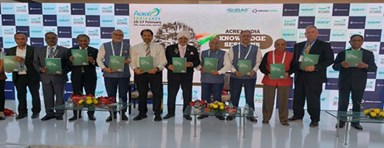 Bengaluru, India (February 23, 2024) — IAPMO India, the leading authority on plumbing, mechanical, and water quality, proudly announced the launch of the much-anticipated 2024 Uniform Mechanical Code – India (2024 UMC-I) last week at ACREX 2024, the premier exhibition for air conditioning, refrigeration, and building services in India.
Bengaluru, India (February 23, 2024) — IAPMO India, the leading authority on plumbing, mechanical, and water quality, proudly announced the launch of the much-anticipated 2024 Uniform Mechanical Code – India (2024 UMC-I) last week at ACREX 2024, the premier exhibition for air conditioning, refrigeration, and building services in India.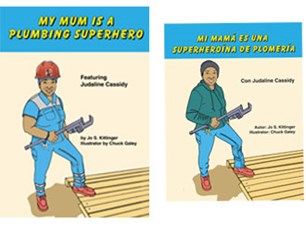 Ontario, Calif. (May 17, 2023) ― Thanks to an overwhelmingly positive response and the desire for it to be accessible to people around the globe, the International Association of Plumbing and Mechanical Officials (IAPMO®) is pleased to announce that “My Mom Is a Plumbing Superhero,” the first children’s book focused exclusively on women plumbers, is now also available in both Spanish-language and international English versions.
Ontario, Calif. (May 17, 2023) ― Thanks to an overwhelmingly positive response and the desire for it to be accessible to people around the globe, the International Association of Plumbing and Mechanical Officials (IAPMO®) is pleased to announce that “My Mom Is a Plumbing Superhero,” the first children’s book focused exclusively on women plumbers, is now also available in both Spanish-language and international English versions.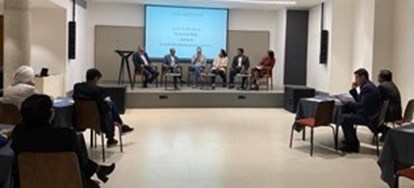 Bengaluru, India (Nov. 11, 2022) —The International Association of Plumbing & Mechanical Officials (IAPMO) group is a U.S. based organisation founded in 1926 to protect public health through better plumbing and water management practices. IAPMO India, established in 2007, hosted a Stakeholder Meeting titled “Let’s Talk Safety, Quality, & Sustainability (SQS)” on 11th November 2022 at the Bangalore International Centre as part of its 15th anniversary celebrations. Participants included water & plumbing industry leaders, government officials, academicians, and thought leaders from built environment sector & city administration.
Bengaluru, India (Nov. 11, 2022) —The International Association of Plumbing & Mechanical Officials (IAPMO) group is a U.S. based organisation founded in 1926 to protect public health through better plumbing and water management practices. IAPMO India, established in 2007, hosted a Stakeholder Meeting titled “Let’s Talk Safety, Quality, & Sustainability (SQS)” on 11th November 2022 at the Bangalore International Centre as part of its 15th anniversary celebrations. Participants included water & plumbing industry leaders, government officials, academicians, and thought leaders from built environment sector & city administration. Bengaluru, India (Jan. 27, 2022) — The International Water, Sanitation and Hygiene Foundation (IWSH) is pleased to announce its support for a cause led by Woloo, an Indian startup company whose app aims to ensure women access to clean, safe and hygienic toilets in public places.
Bengaluru, India (Jan. 27, 2022) — The International Water, Sanitation and Hygiene Foundation (IWSH) is pleased to announce its support for a cause led by Woloo, an Indian startup company whose app aims to ensure women access to clean, safe and hygienic toilets in public places. The IAPMO Group is pleased to announce it has concluded a rigorous approval process to join the Amazon Service Provider Network (SPN), becoming a valuable resource for manufacturers and distributors wishing to sell their products on Amazon’s vast global marketplace.
The IAPMO Group is pleased to announce it has concluded a rigorous approval process to join the Amazon Service Provider Network (SPN), becoming a valuable resource for manufacturers and distributors wishing to sell their products on Amazon’s vast global marketplace.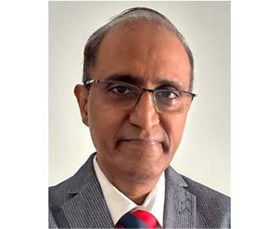 Bengaluru, India (Aug. 2, 2021) — IAPMO India Private Limited, provider of one-stop-shop services including model code and standard development, education, water filtration and plumbing product testing and certification for the maximization of product compliance, acceptance and public confidence, has hired Dr. Nimish Shah, Ph.D., as managing director.
Bengaluru, India (Aug. 2, 2021) — IAPMO India Private Limited, provider of one-stop-shop services including model code and standard development, education, water filtration and plumbing product testing and certification for the maximization of product compliance, acceptance and public confidence, has hired Dr. Nimish Shah, Ph.D., as managing director.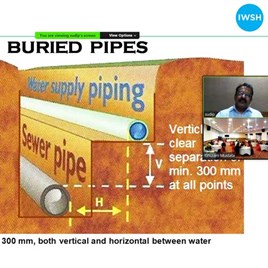 “BORDA South Asia’s plan for the next few years is focused on small town (South Asia) water and sanitation service delivery, which includes direct interventions in eight small towns in India, Bangladesh and Nepal,” said Stanzin Tsephel, regional director for BORDA South Asia. “Our initial assessment is that the technical infrastructure needs upgrades, and municipal engineers need technical capacity building. This is where we think technical organizations like IAPMO can be of great benefit to these municipalities.”
“BORDA South Asia’s plan for the next few years is focused on small town (South Asia) water and sanitation service delivery, which includes direct interventions in eight small towns in India, Bangladesh and Nepal,” said Stanzin Tsephel, regional director for BORDA South Asia. “Our initial assessment is that the technical infrastructure needs upgrades, and municipal engineers need technical capacity building. This is where we think technical organizations like IAPMO can be of great benefit to these municipalities.” 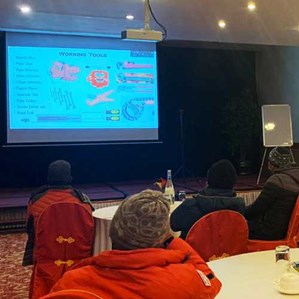 “This is a unique training collaboration between BORDA and IWSH in India,” Saralaya said. “The plumbers utilizing this training will be introduced to effective plumbing systems. We are hoping that this will enable them to understand the principles of good plumbing and adopt the same in the installations they carry out.”
“This is a unique training collaboration between BORDA and IWSH in India,” Saralaya said. “The plumbers utilizing this training will be introduced to effective plumbing systems. We are hoping that this will enable them to understand the principles of good plumbing and adopt the same in the installations they carry out.”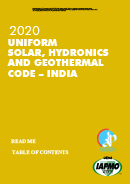 The 2020 USHGC-I is a product of the joint effort of the Indian Plumbing Association (IPA) and IAPMO Plumbing Codes and Standards India Private Limited (IAPMO India). The 2020 USHGC-I is a set of recommendations to everybody involved in the design, engineering, construction or manufacturing of solar energy products and systems. It may be viewed online at http://epubs.iapmo.org/2020/USHGC_India/, and a hard copy will be available for purchase in early 2021.
The 2020 USHGC-I is a product of the joint effort of the Indian Plumbing Association (IPA) and IAPMO Plumbing Codes and Standards India Private Limited (IAPMO India). The 2020 USHGC-I is a set of recommendations to everybody involved in the design, engineering, construction or manufacturing of solar energy products and systems. It may be viewed online at http://epubs.iapmo.org/2020/USHGC_India/, and a hard copy will be available for purchase in early 2021.Bangalore, India (June 26, 2020) – IAPMO India is pleased to announce it is now offering one-stop testing and certification services to NSF/ANSI/CAN 61: Drinking Water System Components – Health Effects to manufacturers seeking to market their products in the United States and Canada.
The NSF/ANSI/CAN 61 standard establishes methods for determining contaminants or impurities imparted indirectly to drinking water. Materials tested and certified are separated by sections representing each of the following product categories:
“It is extremely important that a drinking water filter, purifier or treatment system reduce contaminants as intended, but just as important that the materials that come into contact with drinking water shall not leach any hazardous chemical constituents such as metals, organics and radionuclides,” said Dr. K Chandrasekhar, IAPMO India Managing Director.
In accordance with its mission to protect and improve global health while facilitating speed to market for manufacturers, IAPMO India offers certification of all products covered under the NSF/ANSI/CAN 61 standard. As an independent certifying organization, IAPMO India uses test reports from NABL-accredited laboratories such as Aquadiagnostics Water Research & Technology Centre Limited (AWRTC) to confirm compliance with industry standards such as NSF/ANSI/CAN 61.
For more information on testing, please contact Dr. Muralidhara Rao, AWRTC Managing Director, +91 99 8001 6429 or murali.s@IAPMOAquadiagnostics.org.
For more information on certification, please contact Dr. Abdul Matheen at +91 91 99021 17788 or abdul.matheen@iapmo.org.
To view all of IAPMO India’s services, visit www.iapmoindia.org.
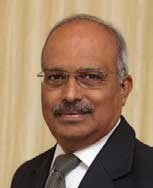 B.S.A. Narayan is one of the founder members and current National Vice President of the Indian Plumbing Association (IPA), Director at the World Plumbing Council (WPC), and Managing Director of Maple Engg-Design Services (India) Pvt Ltd. In his 43 years long career so far, he has designed many plumbing, fire protection and industrial piping systems including water and sewage treatment plants, central LPG systems for hotels, hospitals, factory complexes, software buildings & parks, and commercial buildings in coordination with reputed Indian and multinational architects and developers. In a conversation with Mayur Sharma, he discusses his journey, the activities, and programs of IPA, and emerging concepts of ‘Green Plumbing’.
B.S.A. Narayan is one of the founder members and current National Vice President of the Indian Plumbing Association (IPA), Director at the World Plumbing Council (WPC), and Managing Director of Maple Engg-Design Services (India) Pvt Ltd. In his 43 years long career so far, he has designed many plumbing, fire protection and industrial piping systems including water and sewage treatment plants, central LPG systems for hotels, hospitals, factory complexes, software buildings & parks, and commercial buildings in coordination with reputed Indian and multinational architects and developers. In a conversation with Mayur Sharma, he discusses his journey, the activities, and programs of IPA, and emerging concepts of ‘Green Plumbing’.
Q. Please share your story with us. How has been your journey in the plumbing, piping, and water sector so far?
Mr. Narayan: A small boy in a big family of 12 children, I was born in a village near Bangalore. I had my primary education at a school near my village located at walkable distance from home. I continued my primary and high school in a nearby town while I resided with my elder sister’s family. Then we shifted to Bangalore and Mysore for my higher education. My basic qualification is a Bachelor’s degree in Science followed by a Bachelor’s degree in Civil Engineering from a prestigious college - The National Institute of Engineering, Mysore with Public Health Engineering as elective.
Immediately after my graduation in 1975, I joined a private consulting engineering company which was very famous and they had offices in Bangalore, New Delhi, and Chennai. I started as a trainee design engineer in structural design and after two months I changed my subject and opted for plumbing design. In those days, plumbing engineering was unheard of and people used to laugh at me. Immediately after six months, I was transferred to New Delhi. I worked in New Delhi for eight years with eminent plumbing personalities and then moved out of India for almost eight years. There was no looking back from there.
After coming back from abroad, along with two partners who are specialized in their own field, I started a company which specialized in structural and MEP design. The company has grown from five persons to 500 engineers. We ran this company for twenty-two years and after we parted, I started Maple Engineering Consultancy specialized in MEP design and Maple is also nine years old now.
During the course, I got many awards and recognition and became a fellow of the Royal Institute of Plumbing and Heating Engineers. Apart from this, the Indian Plumbing Association (IPA) also awarded me with the Lifetime Achievement Award in the year 2007, for excellence in the plumbing profession.
My journey into the plumbing industry started in the year 1975. I have come across lots of challenges in this industry. Basically, when we started, we never had a proper education in plumbing nor good standards to follow. I had to struggle hard to collect the design handbooks, codes, and standards from the UK and USA. There were no guides or teachers, and we had to practically design everything and get the drawings done. Over the years, with trial and error method, I learned the basics of plumbing after a good exposure in abroad with international codes and standards. It gave me an in-depth exposure to different practices followed in different countries.
Q. Tell us about your roles - as the National Vice President of IPA as well as the Director of WPC (World Plumbing Council).
Mr. Narayan: As the National Vice President of IPA, we have defined responsibilities and I take care of the technical arm of the IPA. I am also heading the Technical Committee (we call it as TC) as convener and we develop codes and standards in plumbing industry in collaboration with IAPMO (one of the oldest organisation in the USA, who are pioneers in code development).
Till now, we have developed six codes and standards which are dynamic documents and will be revised every four years. IPA has written a handbook on plumbing for common people and the same is translated into several local languages in India. This book provides basic knowledge about the plumbing to be practiced in our day-to-day life. Two years back, I was nominated by IPA to the Executive Board of World Plumbing Council. Right now, I am in charge of Community and Economic Development. The World Plumbing Council wants the best possible plumbing for the world, through the growth and development of the world’s plumbing industry.
Our objective is to create a global network of plumbing industries and to achieve better design and governance in the field of plumbing. WPC is continuously working to improve the image of the plumbing industry by providing advanced education and training. It also emphasizes on plumbing research and innovation (both in technology and policy). A recent major initiative by WPC is termed as “Four Pillars of Plumbing” - namely Participation, Practice, Products, and Protection. I was in-charge from WPC, during the 25th Year Golden Jubilee Celebration of IPA, and WPC was invited to conduct their meeting in India.
Q. Please tell us about the highlights and achievements of Indian Plumbing Association (IPA) in past few years.
Mr. Narayan: IPA has about 19 chapters all over India with about 4,000 members. IPA has developed many plumbing codes which help engineers do plumbing installations as per international practices. Some of these codes are: India’s first Uniform Plumbing Code - UIPC-I (which is followed by many plumbing engineers for plumbing installation that safeguard public health. This code is also referred to by National Building Code 2017); then there is Swimming Pool Code, and also Water-Efficient Products India Code - WEP-I (it rates plumbing fixtures with star ratings to indicate efficiency of the product with respect to water consumption. CII’s Indian Green Building Council has agreed to adopt WEP-I in all ‘green’ buildings being certified by them), while Uniform Solar Energy Code India (USEC-I) is a comprehensive and revolutionary document intended to both standardize the safe and sustainable residential and commercial solar energy and water heating systems.
IPA has also started a world-class ‘Plumbing Lab’ at Pune. The lab demonstrates examples of correct and incorrect plumbing. At this lab, one can see various piping systems and watch the actual flow of water in pipes, etc.
IPA regularly holds exhibitions on plumbing products and services. This helps engineers become aware of the latest plumbing technology. Our last exhibition was held at Nehru Centre, Mumbai on October 26-28, 2018. IPA regularly holds national-level plumbing conferences. In its latest edition - 25th Indian Plumbing Conference, Hardip Singh Puri (Union Minister of State, Ministry of Housing & Urban Affairs) was the Chief Guest. The conference was also attended by Chairman, World Plumbing Council (WPC), and Directors of WPC.
Technical seminars are also held in every few months by individual chapters all over India which our members can attend free-of-cost and learn about new plumbing products and systems.
IPA published India’s only monthly magazine on plumbing - ‘Indian Plumbing Today’ which is circulated free-of-cost to all IPA members.
In 2018, over 800 engineers and plumbing professionals all over India were exposed to the Plumbing Code developed by IPA and also to best practices in plumbing. The program is called IPPL - Indian Plumbing Professionals League. This will directly translate in good and standardized plumbing installations and better help all over India.
IPA has published a book - Guide to Good Plumbing Practices - for the laymen as a guide for correct plumbing installations. With lots of illustrations, it is available in English, Marathi, Malayalam, Hindi, Gujarati, and Bengali. This is the first attempt in India to help the layman understand what correct plumbing is all about. Do’s and Don’ts are also given in this book.
IPA celebrates World Plumbing Day (March 11) every year by encouraging students to be aware of the importance of water conservation. This is done through drawing competitions.
IPA is an association where its members work voluntarily to improve the plumbing standards in India with a view to reduce health-hazards caused by bad plumbing.
Q. How do you see the growth of Indian plumbing and water sector in near future?
Mr. Narayan: The Indian economy is poised to grow at about 7-8% per year. In tandem with this growth, the construction sector (which also includes plumbing) is expected to grow at more than 8% per year. As such, we are very positive about the growth of the plumbing industry. The role of IPA would be to ensure that plumbing installations for every kind of project are done as per the Uniform Plumbing Code developed by IPA and The National Building Code-2016.
Q. What is the concept of IPPL? How successful is it?
Mr. Narayan: As I mentioned earlier, IPA has developed this unique initiative called IPPL (Indian Plumbing Professionals League) which is a combination of learning and fun. IPPL 2018, virtually the flagship program of IPA, has exceeded all expectations. For IPA to fulfill one of its core commitments: “to enable plumbing engineers to be aware of what ‘good’ plumbing is about”, in such a spectacular fashion was unthinkable till last year.
We had an astonishing 13 chapters simultaneously running IPPL programs on Saturday, 1st September 2018. In the words of our National President Gurmit Singh, who wrote on WhatsApp, sums up the collective excitement (generated by IPPL) of the IPA community: “Aaj IPPL Kee Barish Ho Rahi Hai. 13 cities together. What progress! All this will percolate to the betterment of plumbing practices and for recognition of our industry.”
It should be noted that almost all the participants were engineers from leading developers, contractors, and consultants from around the country. The awareness about good plumbing practices will surely percolate down in these organizations leading to better plumbing and reduced health problems arising from bad plumbing. Also to be noted is the point that each of these participants has received a copy of UIPC-I 2017 - Uniform Illustrated Plumbing Code, India. The availability of a detailed reference book like UIPC-I in such large numbers across the country would now help to serve as a benchmark for plumbing installations.
The IPPL community comprises of participants, sponsors, trainers and IPA executives. A total of 822 participants were exposed to good plumbing practices over a period of a few weeks. Over 340 companies sponsored the IPPL event.
The concept of IPPL is to introduce principles of plumbing to engineers who design and supervise plumbing installations. The fact that over 800 participants took part in IPPL 2018 in itself vouches for the success of IPPL. All these participants will now ensure that all plumbing installations done under their supervision would be done as per international standards. This ensures that health hazards to occupants are minimized.
Q. What is the biggest challenge which Indian Plumbing Association faces?
Mr. Narayan: The biggest challenge that IPA faces is how to encourage plumbing engineers to become IPA members and introduce code-based plumbing installations. We hope to reach out to other organizations and convince them about its significance to health that is a result of correct plumbing design and installations. We hope to convince them to become IPA members in due course.
Q. In 2017, IAPMO, IGBC, and IPA had signed an MoU to implement WEP-I 2017 Standard for the Indian Plumbing Products. Your views on it?
Mr. Narayan: Every idea takes time to germinate and show results. We hope that the idea called WEP-I will soon become a standard for most of the reputed builders. The agreement between IAPMO, IGBC, and IPA is surely a step in the right direction and it would help water conservation in our country in the long-term.
Q. Do you think such standards are significant to improve the levels of water safety, quality, and sanitation in India?
Mr. Narayan: For good plumbing, the basis is the good codes and standards which precisely indicates the best practice. A good plumbing installation avoids the contamination of water supplied through the pipe network. Using the proper fixtures and appliances at the right place of installation avoids cross-contamination, thereby, taking care of safety factors.
Proper water treatment to maintain the quality of water as per the norms helps in avoiding a lot of water-borne diseases, and the new codes and standards specify these aspects very well.
Proper design and execution of the sanitation system with water-seal in the traps will avoid the bacteria entering in the habitable areas. The deadly SARS epidemic in Hong Kong was in fact due to faulty plumbing in a residential colony called Amoy Gardens in Kowloon.
Q. What is the future of ‘Green Plumbing’ and ‘Water Efficiency’ in India in your opinion?
Mr. Narayan: The green plumbing is going to be the “in-thing” in India as well as in the whole world. Green plumbing is basically using the water effectively and recycling the used water effectively. The plumbing designers need to practice usage of the treated water effectively without discharging a single liter of water outside.
Also, the designers need to practice the collection and reuse of rainwater in the project. This can be achieved by reusing the excess water for recharges to ground.
Water-efficiency standards are already existing in India and the government has to make these standards mandatory.
If these standards are enforced, in a matter of 5-10 years, we can see the revolution in plumbing and we can definitely witness a ‘Green India’.
Article reprinted with permission of Smart Water & Waste World Magazine, March 2019 www.smartwww.in
IAPMO India to Celebrate Opening
of New Office, Laboratory on Feb. 26
Bengaluru, India (Feb. 13, 2019) — IAPMO India will celebrate the opening of its new testing laboratory and office in Bengaluru, India, during an invitation-only ceremony and lunch at noon Tuesday, Feb. 26. The opening signals IAPMO India’s expansion of the recently acquired Aquadiagnostics’ testing capabilities to include plumbing products testing, in line with The IAPMO Group’s other laboratories in key markets worldwide.
The testing laboratory will offer testing for products to the 2017 Water Efficiency Products – India (WEP-I) standard published by IAPMO India; the upcoming 2019 Energy Efficient Products – India (EEP-I), which is scheduled to be released Feb. 28; ASME A112.18.1 and A112.18.2; and NSF/ANSI 61 and 372. The office and new testing laboratory are located on the fourth floor of No. 43, PMR Tower, Beretena Agrahara, Hosur road, Bengaluru, Karnataka (India).
The IAPMO India office expands on the laboratory services provided by Aquadiagnostics Water Research and Technology Center Limited, an independently accredited testing laboratory that IAPMO India acquired from Eureka Forbes Limited in June 2018. Aquadiagnostics became part of The IAPMO Group, specifically with IAPMO India, and is on the third floor of the building that houses the new office and lab.
“Aquadiagnostics in India is well known for the evaluation of water purification systems using national and international protocols of Bureau of Indian, U.S. EPA Purifier standard and NSF/ANSI 42, 44, 53, 55, and 58 standards,” said Dr. Muralidhara Rao Sakhumalla, Managing Director of Aquadiagnostics Water Research and Technology Center Limited. “In 2004, it became the first laboratory in India to offer MS2 phage bacteriophage testing in water treatment systems. Due to its popularity, quality of testing services and reasonable pricing, manufacturers of water purification systems and components from countries including the United States, Vietnam, Korea, South Africa and France utilize the laboratory.”
The IAPMO Group and IAPMO India offer such one-stop-shop services as model code and standard development, personnel credentialing, education, water filtration and plumbing product testing, and product certification, all integrated in a manner maximizing product compliance, acceptance, and public confidence with a premier independent third-party provider.
ABOUT IAPMO INDIA
IAPMO Plumbing Codes and Standards India Private Limited (known as IAPMO India) was founded in 2007, with an office in Bengaluru. IAPMO India develops the latest and most comprehensive plumbing, mechanical, HVAC, solar, and sustainability/efficiency codes for India. IAPMO India also conducts training and educational activities, develops product performance standards, and certifies products and professionals.
Bengaluru, India (June 25, 2018) — The IAPMO Group is pleased to announce the acquisition of the Aquadiagnostics Water Research and Technology Center Limited, an independently accredited testing laboratory in Bengaluru, India, previously owned and operated by Eureka Forbes Limited, a leading provider of water purification products and allied services to residential and industrial sectors across Asia and Europe. Aquadiagnostics will become part of The IAPMO Group, specifically with IAPMO India.
The addition of Aquadiagnostics gives IAPMO India the ability to immediately provide services to key clients that manufacture water filtration products and produce packaged drinking water, while also verifying potable water supply within India. The new laboratory joins The IAPMO Group’s other internationally accredited labs — Ontario, California; Guangzhou, China; Jakarta, Indonesia; and Melbourne, Australia.
“The acquisition includes 12-15 staff members, who will become IAPMO employees, including the lab’s director, Dr S. Muralidhara Rao, Ph.D.,” said GP Russ Chaney, CEO of The IAPMO Group. “Dr Rao will join numerous other qualified staff enhancing IAPMO India’s services to the plumbing, water treatment, and water supply sectors in India.”
As a result, IAPMO India also plans to immediately expand Aquadiagnostics’ testing capabilities to include plumbing products testing not unlike that which The IAPMO Group performs at its other laboratories in key markets worldwide.
“After a decade of pioneering efforts by Eureka Forbes to create and build Aquadiagnostics into a globally recognized, independent laboratory serving the water industry, we are delighted to see it become part of a leading, global industry organization like IAPMO,” said Marzin R. Shroff, MD, CEO of Eureka Forbes Limited. “We are sure the laboratory will build on its success to serve many industries worldwide under IAPMO’s able stewardship.”
Further, the acquisition enables The IAPMO Group and IAPMO India to now offer such one-stop-shop services as model code and standard development, personnel credentialing, education, water filtration and plumbing product testing, and product certification all integrated in a manner maximizing product compliance, acceptance, and public confidence with a premier independent third-party provider.
“With the continued global growth of IAPMO R&T’s product certification program, customers located in India are excited to have a new option to have their products tested locally,” said Tom Palkon, Executive Vice President IAPMO R&T – Water Systems.
For more information, contact Palkon at +1 708 995 3006 or tom.palkon@iapmo.org or Dr K. Chandrasekhar, Ph.D., Managing Director IAPMO India, at +91 80 30714501 or kannepalli.chandrasekhar@iapmo.org.
Bengaluru, India (March 9, 2018) — IAPMO India has signed a memorandum of understanding (MoU) with the Water Quality India Association (WQIA) calling for IAPMO India to execute the WQIA’s operations in India as the management agency. In addition to managing the WQIA’s daily administrative tasks, IAPMO India will provide direction to help the association achieve its strategic goals.
IAPMO India will manage and organize membership, meetings, standard development, training, certifications, public relations, social media initiatives, and the website, in addition to other routine administrative functions. The leading association for the water treatment industry in India, WQIA will now have IAPMO India’s support in promoting industry initiatives throughout the country. The MoU was signed Feb. 21.
“The IAPMO Group has vast experience in managing associations all over the world, providing the necessary scientific and intellectual input to help associations meet their goals and objectives,” said Dr. K. Chandrasekhar, Interim Managing Director of IAPMO India. Chandrasekhar will also serve as Chief Operating Officer of the WQIA and will work closely with the WQIA board to manage its activities.
“This strategic association with IAPMO India will not only help in better management of the WQIA and its programs, but by including the plumbing industry sets the tone to broaden the scope of water quality in India, where focus on water quality is nascent today,” said outgoing WQIA President Ms. Rajul Parikh, Director of Alfaa UV.
The WQIA’s incoming President, Sarjan Watertech India Pvt. Ltd. Managing Director Mr. Sunil Trivedi, said, “IAPMO’s assistance in effective management of our association will help the WQIA penetrate deeply across the country with various activities for all categories of members and to be a strong supporter of the water industry. It will also help the WQIA fulfill its vision and mission by achieving its objectives.”
About IAPMO India
IAPMO Plumbing Codes and Standards India Private Limited (known as IAPMO India) was founded in 2007, with an office in Bengaluru. IAPMO India develops the latest and most comprehensive plumbing, mechanical, HVAC, solar, and sustainability/efficiency codes for India. IAPMO India also conducts training and educational activities, develops product performance standards, and certifies products and professionals.
About the Water Quality India Association
The Water Quality India Association, incorporated Sept. 16, 2014, under the Indian Companies Act, is a not-for-profit legal entity of the Republic of India. The WQIA has been promoted by members of the India Task Force of the Water Quality Association (WQA). Its mission is to be recognized as a reliable resource for information about water quality issues and to advocate for improved water quality throughout India.
About IAPMO
Sponsor of the Uniform Codes, IAPMO — The International Association of Plumbing and Mechanical Officials — works in concert with government and industry for safe, sanitary plumbing and mechanical systems. Learn more about IAPMO at www.iapmo.org.
Bangaloru India (Dec. 20, 2017) – IAPMO India, during ISHRAE’s conference and ACRESERVE India 2017 tradeshow, introduced the 2017 edition of the Uniform Mechanical Code-India, Illustrated Volume II (2017 UMC-I TM), which covers specific chapters of the UMC-I highlighted as priorities throughout the industry. Volume I was introduced in March at the ACREX India 2017 tradeshow in Delhi.
The 2017 UMC-I provides requirements for the design, installation and maintenance of heating, mechanical ventilation, cooling, refrigeration, and miscellaneous building services and systems, while at the same time allowing latitude for innovation and new technologies. The UMC-I is the most comprehensive document ever created in India to standardize sustainable residential, industrial, and commercial HVAC and mechanical systems.
Subjects contained within the 2017 UMC-I, Illustrated Volume II, include: combustion air, chimneys and vents, steam and hot water boilers, fuel gas piping, process piping, solar systems, stationary power plants/fuel cells, and firestop protection. Volume I covers ventilation air supply, exhaust systems, duct systems, installation of specific appliances, refrigeration systems and cooling towers, and hydronics.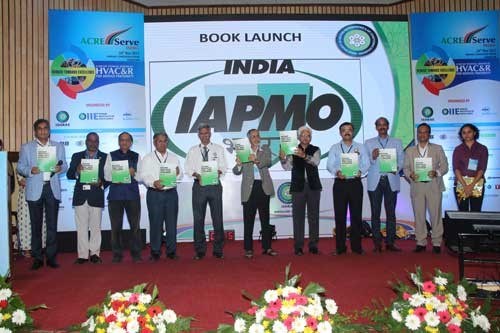
Photo Caption: Mr. S.N. Raju- (President – ASHRAE Bangalore Chapter), Mr. Srikanth N – Bosch India (Past President ISHRAE HC). Satish Iyengar; Mr. Subramaniam, National President Elect ISHRAE (2018-2019), Mr. Nirmal Ram- Past National President ISHRAE Chairman ACREX 2018, Mr. R V Simha- Past National President ISHRAE; Mr. Pankaj Shah - Past National President ISHRAE; Mr. Nagaraj T (President ISHRAE BC), Mr. Elangovan (President elect BC); Dr. Abdul Matheen (Director IAPMO India) and Swathi Saralaya (IAPMO India)
“IAPMO India aims to meet our country’s growing need in this space through various codes and standards, such as the Uniform Mechanical Code-India,” said R V Simha, HVAC Consulting Engineer and founding member of ISHRAE. “The efforts of IAPMO India’s dedicated, earnest determinations over the years are duly being rewarded. This trend is sure to continue and take you and your organization to taller and taller peaks of achievement.”
The process of developing the standard brought together volunteers representing varied viewpoints and interests to achieve consensus on mechanical issues. IAPMO India hopes widespread awareness and adoption of this code will result in a combined effort by the entire construction and infrastructure sector toward a cleaner and greener environment, thereby greatly reducing India’s carbon footprint.
“It gives us a great opportunity to be associated with societies such as ISHRAE and organizations across India to develop the 2017 UMC-I, representing an invaluable combination of our globally gathered expertise and knowledge of India’s best and most seasoned HVAC-R professionals,” said Megan Lehtonen, Senior Vice President of International Business Development for The IAPMO Group. “Indeed, a fruitful relationship that goes a long way in creating better standards and professionals, ultimately working for the benefit of the Indian society.”
“Widespread awareness and adoption of these codes could result in a combined effort by the entire construction and infrastructure sector toward a cleaner and greener environment, thereby greatly reducing the carbon footprint,” said Neeta Sharma, IAPMO India Managing Director.
In support of the standard, IAPMO India’s UMC-I certification assists HVAC-R product manufacturers in marketing energy efficient heating ventilation, air conditioning, refrigeration, and allied products by promoting acceptance by Authorities Having Jurisdiction across the country. Similarly, IAPMO India further supports the UMC-I via its cutting-edge concept of code-based education, including the Mechanical Education to Employment Program (MEEP), which trains university and trade school students at the entry level to address the impending shortage of skilled workers. Graduates of the multi-level MEEP training receive the option of obtaining professionally qualified certifications.
The 2017 UMC-ITM provides required guidelines for the design, installation and maintenance of mechanical building services and systems, while at the same time allowing latitude for innovation and new technologies. The UMC-I is the most comprehensive document ever created in India to standardize sustainable residential, industrial and commercial HVAC and mechanical systems. Subjects contained within 2017 UMC-I, Illustrated Volume II, include: combustion air, chimneys and vents, steam and hot water boilers, fuel gas piping, process piping, solar systems, stationary power plants/fuel cells, and Firestop protection. Whereas 2017 UMC-I, Illustrated Volume –I, which was introduced and launched during early 2017, at ACREX India 2017 tradeshow held at Delhi, include: ventilation air supply, exhaust systems, duct systems, installation of specific appliances, refrigeration systems and cooling towers, and hydronics.
About IAPMO INDIA
The International Association of Plumbing and Mechanical Officials (IAPMO) have a strong cooperative presence in the nation of India and partnered with the Indian Plumbing Association (IPA) The registrar of companies of India in 2007 approved the establishment of IAPMO Plumbing Codes and Standards India Private Limited, to be known as IAPMO- India. IAPMO India is the leading professional organization in India, dedicated to the improvement of health, hygiene, safety, comfort and water & energy efficiency in building industry. It encourages the development and application of both water and energy conservation. In these areas, IAPMO India has a significant impact on National and International strategic planning and research initiatives, as well as on the associated codes & standards development, educational and training programmes.
Jaipur, India (Nov. 6, 2017) – The International Association of Plumbing and Mechanical Officials (IAPMO), the Confederation of Indian Industry-Ind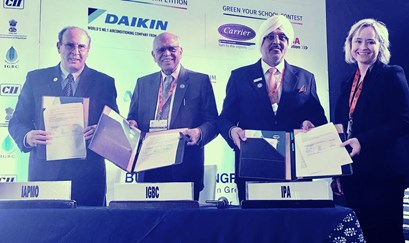 ian Green Building Council (IGBC) and the Indian Plumbing Association (IPA) have entered into a Memorandum of Understanding (MoU) with the goal of implementing the Water Efficient Products — India (WEP-I) 2017 standard in India.
ian Green Building Council (IGBC) and the Indian Plumbing Association (IPA) have entered into a Memorandum of Understanding (MoU) with the goal of implementing the Water Efficient Products — India (WEP-I) 2017 standard in India.
As a result of the MoU, the IGBC will adopt the WEP-I 2017 standard for green product certification for plumbing products, considering an Indian context. The three organizations agree to work together on the following areas:
• Use of WEP-I 2017 for plumbing products for India, implementing green measures for the entire life cycle of the products, including the design, manufacturing process, product use and end-of life management.
• Recognition of WEP-I 2017 for plumbing products in IGBC and GreenPro — Green certification rating systems.
• IGBC and IPA endorsement of IAPMO’s testing and certification within India for plumbing and water treatment products, ensuring water conservation, energy efficiency and performance targets are met in accordance with WEP-I 2017 requirements.
• IGBC and IPA recognition of IAPMO India as a third-party inspection body for assessing the sustainability of IGBC-approved green projects.
• Identifying new avenues to further IGBC’s green footprint throughout the plumbing industry.
• Participating in and supporting each other’s events without any financial commitments; conducting joint events; and creating opportunities to enhance networking among the groups’ members.
The MoU was signed Oct. 5 by IAPMO CEO GP Russ Chaney; IPA National President Gurmit Singh Arora; and V. Suresh, Director of Advocacy for the IGBC, at the Green Building Congress in Jaipur. The MoU is valid for three years, and may be renewed for an additional three years.
“IAPMO has had a 10-year partnership with the Indian Plumbing Association and a very good working relationship with the Indian Green Building Council,” IAPMO Group CEO GP Russ Chaney said, “so this MoU serves to strengthen those relationships by providing IAPMO India’s Water Efficiency Products – India program as the baseline for the IGBC’s green rating schemes that serve to enhance the energy and water use efficiency of new buildings being constructed throughout all of India.”
Dr. Prem Jain, Chairman of the IGBC, said the organizations will work together to protect the water supply for future generations.
“India is facing a grave crisis of acute shortage of domestic water,” he said. “Over the last 60 years since the industrial revolution came to India, our rivers, water bodies and even underground water reserves have gotten heavily polluted from chemical waste. The CII-IGBC, a nonprofit organization founded in 2001, has been actively pursuing restoration of water resources and conservation of domestic water. The IPA and IAPMO have been our esteemed partners in developing and training our engineers and work force in green plumbing practices, and also providing testing and rating of locally manufactured plumbing fixtures and fittings. Together we will ensure that our younger generations, and generations not yet born, enjoy the abundance of safe and clean domestic water and bounties of our natural resources.”
IPA National President Gurmit Singh Arora said the MoU would play a key role in saving valuable resources.
“I am delighted at the acceptance of the Water Efficient Products India 2017 code by the CII-IGBC for all its 21 ratings being prescribed for Green Project Ratings today,” he said. “This will universally help IPA in achieving its goals of saving precious water, without compromising on the comfort of the user. CII-IGBC, with a green footprint of 4.65 billion square feet and 92 percent market share in India — aspiring to touch 10 billion square feet by 2022 — will help in achieving this goal in saving billions of liters of water.”
Ontario, Calif. (March 10, 2017) — The International Association of Plumbing and Mechanical Officials (IAPMO) is proud to announce that Neeta Sharma, Managing Director of IAPMO India, recently was honored at World CSR Day as one of the 50 Most Impactful Leaders (Global Listing) in Water & Water Management.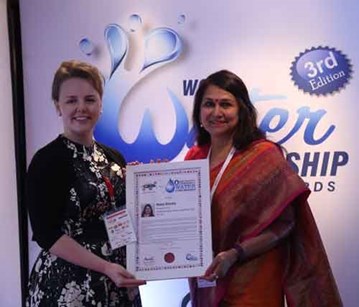
The distinction honors leaders who are passionate about water management, who believe that water management must contribute to social change. The citation was announced Feb. 17 at the World Water Leadership Congress & Awards program in Mumbai.
“We extend our congratulations to Neeta for this outstanding news and are very proud of this high honor that has been bestowed upon her,” IAPMO CEO GP Russ Chaney said.
A jury of senior professionals from across the globe reviewed a list of candidates who are doing extraordinary work. The criteria were: improvement of water efficiency and conservation; demonstrated leadership within the sector that has had a positive impact in the advancement of water management; contribution toward water-related groups, associations and institutions; demonstration of good leadership and governance; and contribution to water awareness in the community.
Sharma, who joined IAPMO in 2013, has more than 30 years’ experience in public/private work within the standardization and technical fields.
“This honor encourages me to optimize every opportunity I get and bring more laurels home,” Sharma said. “Considering the fact water conservation still doesn’t get the importance it deserves, it further strengthens my resolve to work in this direction."
Dave Viola, Chief Operating Officer and Executive Vice President of The IAPMO Group, echoed Chaney’s sentiments. “I cannot express how proud we are to learn of this very impressive acknowledgment,” Viola said. “It is a true testament to the meaningful work that Neeta and her team are carrying out in India.”
About IAPMO India
IAPMO Plumbing Codes and Standards India Private Limited (known as IAPMO India) was founded in 2007 with offices at Bengaluru and Delhi. IAPMO India and the Indian Plumbing Association (IPA) began, and continue to foster, a strong and essential partnership to better provide for the industry. The latest and most comprehensive plumbing codes and training and education programs for code-based plumbing installations and maintenance for all of India developed from this partnership.
Ontario, Calif. (Sept. 1, 2016) — IAPMO India has certified the first two water treatment devices to the Certification Scheme for Drinking Water Treatment Systems that Make Microbiological Reduction Claims, making both products eligible to receive a Seal of Purity from the Water Quality India Association (WQA India).
KENT RO Systems Limited received the Seals of Purity for two water purifiers, the Grand and the Pearl.
“KENT manufactures domestic reverse-osmosis water purifiers to the highest standards and these two models were already certified by NSF & WQA,” said Ekansh Mittal, Executive Assistant to the CMD for KENT RO Systems Ltd. “We are now pleased to receive the certification for the claim of microbiological reduction from WQA India through IAPMO. We will continue to offer the highest quality water treatment systems to our consumers.”
In February, IAPMO India and WQA India entered into a memorandum of understanding (MOU) establishing an agreement to collaborate on the administration of the Certification Scheme for Drinking Water Treatment Systems that Make Microbiological Reduction Claims.
“IAPMO is proud to partner with WQA India to offer the Seal of Purity on products that pass rigorous performance testing criteria and strict certification requirements, including on-site factory inspections,” said IAPMO Senior Vice President – Water Systems Tom Palkon. “I would like to congratulate KENT RO for achieving the Seal of Purity for two of its products.”
Point-of-use systems for drinking water treatment are used in households to alleviate health risks by reducing numerous potential disease-causing contaminants, including bacteria, viruses, and disinfectant resistant parasites. The new certification scheme, which conforms to ISO/IEC 17067 “Conformity Assessment – Fundamentals of Product Certification and Guidelines for Product Certification Schemes,” establishes standards
by which such products’ reduction claims may be measured and certified as satisfying.
About WQA INDIA
The Water Quality India Association is a legal entity in the Republic of India. This not-for-profit entity was incorporated on Sept. 16, 2014, under the Indian Companies Act and has been promoted by the members of India Task Force of Water Quality Association. This not-for-profit entity collaborates with the Water Quality Association USA, but functions independently.
Mumbai, India (Feb. 25, 2016) — IAPMO India and Water Quality India Association (WQA India) have entered into a memorandum of understanding (MOU) establishing an agreement to collaborate on the administration of the Certification Scheme for Drinking Water Treatment Systems that Make Microbiological Reduction Claims.
WQA India, an independent, not-for-profit organization dedicated to water quality improvement, has developed a microbiological standard for evaluation of water treatment devices that make claims of microbiologically safe water. Products meeting this standard will be given the “Seal of Purity” by WQA India. This will be an important differentiator in the marketplace between compliant and non-compliant products.
IAPMO India, which operates successful certification programs for the plumbing industry, will now undertake certification of products seeking listing to the new microbiological standard. Some of IAPMO’s better known certification programs include Uniform Illustrated Plumbing Code – India (UIPC-I), Uniform Mechanical Code – India (UMC-I), Uniform Solar Energy Code – India (USEC-I), and Water Efficient Products – India (WEP-I) standards
“IAPMO is excited to partner with WQA India on this effort,” said Tom Palkon, IAPMO Senior Vice President – Water Systems. “Product testing and certification of water treatment equipment provides consumers added confidence in products they purchase to protect their family.”
Point-of-use systems for drinking water treatment are used in households to alleviate health risks by reducing numerous potential disease-causing contaminants, including bacteria, viruses, and disinfectant resistant parasites. The new certification scheme, which conforms to ISO/IEC 17067 “Conformity Assessment – Fundamentals of Product Certification and Guidelines for Product Certification Schemes,” establishes standards by which such products’ reduction claims may be measured and certified as satisfying.
“Microbiological impurities, such as bacteria and viruses, are the number one cause of waterborne diseases and infant deaths in India,” said Rajul Parikh, President, WQA India. “WQA India has launched a product certification program, which will certify that the product in question meets with stringent microbiological norms. Such complying products will be marked with a unique “Seal of Purity,” easy for the customer to recognize. WQA India plans to offer newer certifications in the future, testing water purifiers to different standards, and will be collaborating with IAPMO toward this goal.”
About WQA India
The Water Quality India Association is a legal entity in the Republic of India. This not-for-profit entity was incorporated on Sept. 16, 2014, under the Indian Companies Act and has been promoted by the members of India Task Force of Water Quality Association (WQA). This not-for-profit entity collaborates with the Water Quality Association USA (WQA), but functions independently.
January 14, 2016
Dear Clients and Industry Partners:
IAPMO’s Uniform Evaluation Service (UES) provides evaluation reports of the highest integrity that offer manufacturers a fully qualified and accredited alternative to those issued by ICC. Despite ICC’s unwarranted assertions, IAPMO UES stands by our process, our reports, and our rightful position in the marketplace.
In October of last year, ICC approached The IAPMO Group with concerns that there were similarities in the wording between our Uniform Evaluation Reports and those of ICC. Although we believed then, as we do now, that ICC's claims were without legal merit, IAPMO made significant efforts in the intervening months to placate ICC's demands, including amending the process by which we create reports and reissuing some reports in a manner that we expected would fully address ICC's concerns. ICC contends that a minimal number of evaluation reports posted to the IAPMO website are infringing; which IAPMO emphatically denies.
Notwithstanding our efforts over the last several months to address ICC's concerns, we were disappointed to learn that ICC has recently filed a lawsuit and has embarked on an acrimonious and inflammatory public relations campaign directed against IAPMO. While we believe that our legal position will ultimately be vindicated in court, the larger point is our right to operate our service in the same marketplace. And despite ICC's efforts to chill competition in that marketplace, we will continue to operate our service to manufacturers and others in the plumbing and building industries.
ICC's recent decision to unnecessarily and preemptively file a lawsuit in midst of pending discussions between the two organizations is all the more surprising in light of the recent decision of the Minnesota Appeals Court, which dismissed all of ICC's claims of wrongdoing that it had directed against the Minnesota Plumbing Board. ICC's unsuccessful lawsuit against the Minnesota Plumbing Board was filed by ICC in response to that State’s recent adoption of IAPMO’s Uniform Plumbing Code.
IAPMO UES wishes to assure existing and prospective clients that our services and the reports we generate remain every bit as valuable and legally viable as they have always been. In this regard, UES Evaluation Reports continue to be accepted by code enforcement officials who seek validation that the products in question satisfy applicable code requirements within the scope and conditions of use as noted in our reports.
We are confident that our actions will be fully vindicated in the context of ICC's recent lawsuit. We are equally confident that our customers, clients, and the public at large will recognize and understand that ICC’s recent actions against IAPMO are simply the latest episode in an ongoing campaign to promote the business interests of ICC ES and to undermine public confidence in IAPMO UES’s accredited building product listing program.
Sincerely,
GP Russ Chaney,
CEO, The IAPMO Group
The sustainable building industry today has a powerful and revolutionary new tool at its disposal with the launch of IAPMO India’s (International Association of Plumbing and Mechanical Officials-India) Green Mechanical Code Supplement India (2014 GMCS-I), the most comprehensive document ever created in the history of India to standardize sustainable residential and commercial mechanical HVAC-R systems.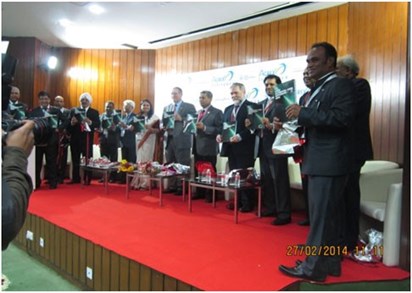 The GMCS-I is a set of recommendations to all those who are involved in the design, engineering, construction, installation, operation, maintenance and manufacturing of heating ventilation and air-conditioning systems; incinerators; and other miscellaneous heat-producing appliances. The development process brings together volunteers representing varied viewpoints and interests to achieve consensus on mechanical issues.
The GMCS-I is a set of recommendations to all those who are involved in the design, engineering, construction, installation, operation, maintenance and manufacturing of heating ventilation and air-conditioning systems; incinerators; and other miscellaneous heat-producing appliances. The development process brings together volunteers representing varied viewpoints and interests to achieve consensus on mechanical issues.
India is witnessing tremendous growth in infrastructure development. The construction industry in India is one of the largest economic activities and has been growing at an annual rate of 11 percent as compared to the global average of 5 percent. This undoubtedly calls for increased use of natural resources such as energy, water and materials, which in turn would aggravate the global concern of carbon emissions and its impact on the quality of life. IAPMO India believes the construction sector therefore should play a responsible role toward preservation of the environment.
Commenting on the significance of the GMCS-I, Neeta Sharma, managing director of IAPMO India, said: “It gives us a great opportunity to be associated with many like minded professionals, societies and organizations pan India to develop the Green Mechanical Code Supplement India, an invaluable combination of our globally gathered expertise and the knowledge of India’s best and most seasoned HVAC-R professionals. Indeed, a fruitful relationship that will go a long way in furthering sharing of knowledge for creating better standards and professionals, which will ultimately work for the benefit of the Indian society.”
Codes and standards forms part of the mandatory requirement in building design to bring back planet earth from the ill effects of global warming, climate change, and carbon emissions and contribute to water and energy conservation.
“IAPMO India aims to meet this need in the mechanical HVAC-R domain in our small and humble way through the introduction of the Green Mechanical Code Supplement India,” said Abdul Matheen, director Mechanical, IAPMO India.
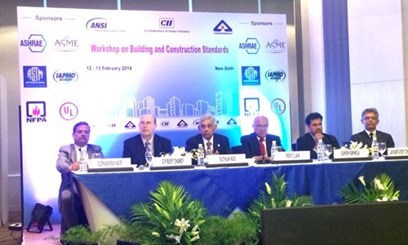 New Delhi, India (Feb. 18, 2014) — The International Association of Plumbing and Mechanical Officials (IAPMO®) last week joined other prominent industry stakeholders as a sponsor and participant of the ANSI-CII-BIS Workshop on Building and Construction Standards, Feb. 12-13, at Hotel Le Meridien in New Delhi.
New Delhi, India (Feb. 18, 2014) — The International Association of Plumbing and Mechanical Officials (IAPMO®) last week joined other prominent industry stakeholders as a sponsor and participant of the ANSI-CII-BIS Workshop on Building and Construction Standards, Feb. 12-13, at Hotel Le Meridien in New Delhi.Kerala, India (Jan. 13, 2014) — IAPMO India and the Indian Plumbing Association (IPA) have partnered with the government of Kerala to provide plumbing training for students enrolled in the state’s Additional Skill Acquisition Program (ASAP), a unique strategy designed to equip students with beneficial skill sets alongside their regular academic studies in schools and colleges.
The Indian government’s National Skill Development Mission projects an increased demand for skilled manpower to sustain the nation’s industrial and thereby economic growth, and that training that will promote skill formation within the general populace is not only essential, but will enhance their capacity to undertake gainful self employment and access to higher-paying employment within industries identified as skill sectors.
ASAP, a joint initiative of the government of Kerala’s departments of Higher Education and General Education, aims to fulfill growing skilled manpower requirements and bridge the gap between supply and demand. Within this framework, ASAP will seek to provide quality industry-oriented skill training to more than 300,000 deserving students via a network of selected schools and colleges across Kerala over a period of five years.
The Plumbing Apprentice Program to be administered by IAPMO India and the IPA is designed such that students enrolled in ASAP can take the program as an add-on and become equipped to take various jobs in the Indian plumbing industry.
IAPMO India, in consultation with the government of Kerala, will administer the plumbing program through approved training programs including: Govt. College Kattapana, GHSS Perumbavoor; Govt. College Kasargod; IASC Thrissur; Gove. College Mananthavady; Govt. Model HS Calicut, and numerous others.
Administration includes lectures and practical training, conducting of examinations, evaluations, assessments, and the issue of marks/grades and award certificates. The government of Kerala will issue certificates that are jointly signed by government officials and IAPMO India to students who successfully complete the program.
ABOUT IAPMO INDIA
IAPMO Plumbing Codes and Standards India Private Limited (known as IAPMO India) was founded in 2007 with offices at Bengaluru and Pune. IAPMO India and the Indian Plumbing Association (IPA) have formed a strong and essential partnership to provide for the industry and India at large. The latest and most comprehensive plumbing codes and training and education programs for code-based plumbing installations and maintenance for all of India continue to improve through the expertise and focus of this partnership. The strength of these programs is anchored by the support from prominent organizations including CII, Indian Green Building Council, TERI, ISHRAE, BAI, state governments, and many others.
For more information, direct your web browser to http://www.iapmoindia.org.
Ontario, Calif. (Jul. 25, 2013) — IAPMO India asks you join us in congratulating HSIL Limited, on their approaching first anniversary next October, for being the first company to certify their ‘Hindware’ brand of efficient water closet models to the 2011 Uniform Plumbing Code – India™ (UPC-I) and to star rate them for water efficiency to the 2011 Water Efficient Products – India (WEP-I) specification with IAPMO India!
HSIL Limited is a leading manufacturer and market leader of vitreous china sanitary ware products for the architectural, commercial, correctional, industrial, institutional and residential sectors.
Since last October 2012 when HSIL earned their two new product listing certificates, architects, consumers, contractors, engineers, plumbing instructors, plumbing designers, and inspectors alike throughout India were assured that HSIL’s listed water closets comply with the water efficient performance test standards as listed and rated on both certificates for use throughout India. Both listings are the first product categories of their kind listed by IAPMO India, and both listings (UPC-I™ file #IN-1005, and WEP-I file #IN-1006) continue being accessible for public view on IAPMO India’s web product listing directory.
IAPMO India’s UPC-I™ and WEP-I listing marks of conformity gives manufacturers like HSIL, and society assurance that such products have passed comprehensive water consumption efficiency laboratory testing, engineering evaluation and review to the required plumbing performance standards and codes so that compliance and ratings may be confirmed and documented. Further, IAPMO India executes a surveillance inspection program on a regular basis at the products’ manufacturing plant(s) to help insure that such listed products continue to comply with all certification requirements – All these efforts help to give continued reliance and assurance over the feelings of uncertainty people have when wondering about the use of uncertified products.
"We are very excited to have IAPMO India list our high efficiency water closets and to state that IAPMO India's product listing service was very professional and efficient," said Mr. R. K. Somany, Chairman & Managing Director for HSIL Limited.
Since 2007, IAPMO India, a private organization, has established a successful partnership with the Indian Plumbing Association to develop various industry codes, e.g., the Uniform Plumbing Code – India™ (UPC-I), Uniform Solar Energy Code – India™ (USEC-I), Uniform Swimming Pool Code – India™ (UPSC-I), Green Plumbing Code Supplement – India™ (GPCS-I), and the water efficiency rating specification Water Efficient Products – India(WEP-I), as well as plumbing training and educational programs (now in session) throughout India for designers, contractors, students and engineers. IAPMO India also similarly worked with the upper hierarchies of the Fire and Security Association Of India and the Indian Society of Heating, Refrigerating and Air Conditioning Engineers to develop the Uniform Mechanical Code – India (UMC-I) for products used within mechanical systems. Click to view a brochure that briefly describes IAPMO India and its product listing programs.
There's never been a better time than today to join other manufacturers and apply for IAPMO India’s newly launched product listing programs, and to begin marketing your products as IAPMO India certified products.
For more information please contact Swathi Saralaya (swathi.saralaya@iapmo.org) of our Bengaluru, India staff at +91-80-30714500.
Ontario, Calif. (Jul. 22, 2013) — IAPMO India asks you join us in congratulating Viega GmbH & Co. KG, on their approaching first anniversary next September, for being the first company to UPC-I™ certify its press type ‘Profipress’ copper alloy fittings (file #IN-1001), and its press type ‘Sanpress Inox’ stainless steel fittings (file #IN-1002) with IAPMO India!
The Viega Group is a leading manufacturer of plumbing piping systems for the architectural, commercial, correctional, industrial, institutional and residential sectors.
Since last September 2012 when Viega earned their two new UPC-I fittings listing certificates, architects, consumers, contractors, engineers, plumbing instructors, plumbing designers, and inspectors alike throughout India were assured that all Viega’s listed fittings comply with the performance test standards as listed on both certificates for their use throughout India, as well as to the 2011 Uniform Plumbing Code – India™ (UPC-I). Both listings are the first product categories of their kind to be listed by IAPMO India, and both listings continue to be available for public view on IAPMO India’s web product listing directory.
IAPMO India’s UPC-I listing mark of conformity gives manufacturers like Viega, and society the assurance that such products have passed comprehensive laboratory testing, engineering evaluation and review to the required plumbing performance standards and codes so that compliance may be confirmed and documented. Further, IAPMO India executes a surveillance inspection program it makes on a regular basis at the products’ manufacturing plant(s) to help insure that such listed products continue to comply with all certification requirements – All of these efforts help to give reliance and assurance over the feelings of uncertainty people have when considering the use of uncertified products.
“We are very excited to have IAPMO India list our copper and stainless steel press type fittings,” said Mr. Shailesh Khamar, Country Head India for Viega GmbH & Co. KG.
Since 2007, IAPMO India, a private organization, has established a successful partnership with the Indian Plumbing Association to develop various industry codes (e.g., the Uniform Plumbing Code – India (UPC-I), Uniform Solar Energy Code – India™ (USEC-I), Uniform Swimming Pool Code – India™ (UPSC-I), Green Plumbing Code Supplement – India™ (GPCS-I), and the water efficiency rating specification Water Efficient Products – India(WEP-I), as well as plumbing training and educational programs (now in session) throughout India for designers, contractors, students and engineers. IAPMO India also similarly worked with the upper hierarchies of the Fire and Security Association Of India and the Indian Society of Heating, Refrigerating and Air Conditioning Engineers to develop the Uniform Mechanical Code – India™ (UMC-I) for products used within mechanical systems. Click here to download a brochure that briefly describes IAPMO India and its product listing programs.
There's never been a better time than today to join other manufacturers and apply for IAPMO India’s newly launched product listing programs, and to begin marketing your products as IAPMO India certified products.
For more information please contact Swathi Saralaya (swathi.saralaya@iapmo.org) of our Bengaluru staff at +91-80-30714500.
New Delhi, India (April 26, 2013) – The Indian building industry now has powerful and revolutionary new tools at its disposal with the introduction of IAPMO India’s 2012-UMC-I Illustrated Training Manual™ (2012 UMC-I ITM™), and launch of the Mechanical Education to Employment Program (MEEP) during ACRECONF- 2013 at the India Habitat Centre. ACRECONF (Air-Conditioning-Refrigeration-Conference) is an international conference of HVAC-R professionals, sponsored by ISHRAE.
The UMC-I ITM provides required guidelines for the design, installation and maintenance of heating, mechanical ventilation, cooling, refrigeration and miscellaneous building services and systems, while at the same time allowing latitude for innovation and new technologies. It is the most comprehensive document ever created in India to standardize sustainable residential, industrial and commercial mechanical systems. The process of developing the UMC-I, ITM brought together volunteers representing varied viewpoints and interests to achieve consensus on mechanical issues. Widespread awareness and adaptation of the UMC-I could result in a combined effort by the entire construction and infrastructure sector toward a cleaner and greener environment, thereby greatly reducing the carbon footprint.
The MEEP addresses a widening skills gap in India — the slim availability of high quality professionals compounded by the galloping pace of the country’s construction and allied-service driven economy, which is growing faster than most countries worldwide. As businesses propose to double and triple their workforce and India strives to maintain its position in the global marketplace, it has become imperative to prepare and plan for a world-class, competent, talented and innovative pool of workers. In response to these challenges, IAPMO India has introduced the cutting-edge MEEP concept, training university students in order to tackle the impeding shortage of knowledgeable, skilled workers. Graduates of the multi-level MEEP education programs will be given the option of obtaining professionally qualified certifications with the following credentials:
“It gives us a great opportunity to be associated with many likeminded professionals, societies and organizations pan India to develop the UMC-I ITM, and will thus be an invaluable combination of our globally gathered expertise and the knowledge of India’s best and most seasoned HVAC professionals,” said Megan Lehtonen, director of Business Development, IAPMO USA. “Such fruitful relationships will undoubtedly go a long way in furthering the sharing of knowledge for creating better standards, and professionals who would ultimately work for the benefit of Indian society.”
Abdul Matheen, director Mechanical, IAPMO India, said: “Codes, standards and code-based education form part of the mandatory requirements in building design to help heal the planet from the harmful effects of Global Climate Change, which also contributes to water and energy conservation. We at IAPMO India hope to sow seeds of change in the mechanical industry through codes, standards and education; through the UMC-I ITM and the MEEP education programs being launched today.”
For more information on IAPMO India’s latest initiatives, please contact Swathi Saralaya (swathi.saralaya@iapmo.org) of our Bengaluru staff at +91-80-30714500.
Ontario, Calif. (Oct. 15, 2012) — IAPMO India is pleased to announce that it now lists copper and stainless steel press type fittings for Viega, GmbH & Co. KG, a leading manufacturer of plumbing piping systems for the architectural, commercial, correctional, industrial, institutional and residential sectors.
As a result of Viega’s two new fittings listings, architects, consumers, contractors, engineers, plumbing instructors, plumbing designers, and inspectors alike now know that the listed Viega press type fittings systems comply with the standards as listed on the certificate for their use throughout India. Both listings are the first product categories of their kind to be listed by IAPMO India, and their web listings may be seen here.
“We are very excited to have IAPMO India list our copper and stainless steel press type fittings,” said Shailesh Khamar, Country Head India for Viega, GmbH & Co. KG.
Based in Attendorn, Germany, Viega is a longtime repeat client of IAPMO R&T (IAPMO India’s sister company), having previously listed many other product categories for more than 15 years.
Since 2007, IAPMO India, a private, non-governmental organization, has established a successful partnership with the Indian Plumbing Association (www.indianplumbing.org) to develop various industry codes (e.g., the Uniform Plumbing Code – India™ (UPC-I), Uniform Solar Energy Code – India™ (USEC-I), Uniform Swimming Pool Code – India™ (UPSC-I), Green Plumbing Code Supplement – India™ (GPCS-I), and the water efficiency rating specification Water Efficient Products India (WEP-I), as well as plumbing training and educational programs (now in session) throughout India for designers, contractors, students and engineers. IAPMO India also similarly worked with the upper hierarchies of the Fire and Security Association Of India (http://www.fsai.in) and the Indian Society of Heating, Refrigerating and Air Conditioning Engineers (http://www.ishrae.in) to develop the Uniform Mechanical Code – India™ (UMC-I) for products used within mechanical systems. Click here to download a brochure that briefly describes IAPMO India and its product-listing program.
There's never been a better time than today to join other manufacturers and apply for IAPMO India’s newly launched product listing program, and to begin marketing your products as IAPMO India-listed products.
For more information on having products listed, please contact Swathi Saralaya (swathi.saralaya@iapmo.org) of our Bengaluru staff at +91-80-30714500.
Bangalore, India (July 20, 2012) – IAPMO India has released the 2012 Uniform Solar Energy Code India™ (USEC‐I), a comprehensive and revolutionary document intended to both standardize safe and sustainable residential and commercial solar energy and water heating systems and ignite a renaissance for solar technologies in the rapidly developing nation.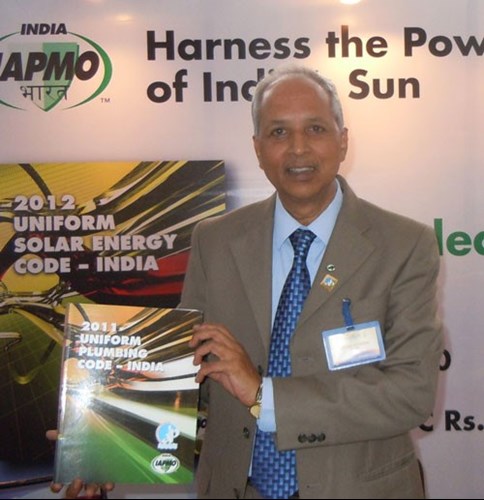 The introduction was made during the 16th Indian Plumbing Conference in Kochi, India, jointly organized earlier this month by the Indian Plumbing Association (IPA) and Akar InfoMedia Pvt. Ltd. (AIM). The 2012 USEC‐I places a powerful tool in the hands of those who design, engineer, manufacturer, install, operate and maintain solar energy and heating systems and their components within India.
The introduction was made during the 16th Indian Plumbing Conference in Kochi, India, jointly organized earlier this month by the Indian Plumbing Association (IPA) and Akar InfoMedia Pvt. Ltd. (AIM). The 2012 USEC‐I places a powerful tool in the hands of those who design, engineer, manufacturer, install, operate and maintain solar energy and heating systems and their components within India.
Jointly developed by IAPMO India and the IPA, the USEC‐I is designed as a scientifically sound model code that supports, via performance standards, renewable energy sources in the form of passive and active solar energy as potential alternatives to fossil fuels while still allowing latitude for innovation and new technologies. Solar power has emerged as one of the most rapidly growing renewable sources for thermal energy, photovoltaic power and concentrating power.
“As one of the fastest growing economies of the world, involved in numerous development projects across the country, India has been in constant search of alternative sources of affordable energy,” said IPA President Sudhakaran Nair. “The USEC‐I will prove to be a handy guide to those working toward this endeavor. “On behalf of all of us in the Indian plumbing industry, I sincerely thank our esteemed colleagues at IAPMO for their unstinted support to us in our efforts.”
The USEC‐I is the only code document of its kind in India. It is based on IAPMO’s Uniform Solar Energy Code, originally published in 1976 and now designated as an American National Standard by the American National Standard Institute (ANSI).
“God’s own country witnessed an historic moment at Kochi during the inaugural session of the 16th Indian Plumbing Conference when the 2012 Uniform Solar Energy Code India was release,” said Sree Kumar, director general of IAPMO India. “This outstanding, significant document, evolved with the dedicated efforts of the IPA and IAPMO, will be, I am sure, greatly beneficial to India and our society for good health, keeping in line with our mission of ‘Global Health.’ ”
Bangalore, India (Feb. 23, 2012) – IAPMO India has released the 2012 Uniform Mechanical Code India™ (UMC-I), the first and most comprehensive document ever created to standardize safe and sustainable residential and commercial mechanical systems in India. The introduction was made during ACREX India 2012, South Asia’s premier event for the mechanical HVAC & R industry and its associated trades.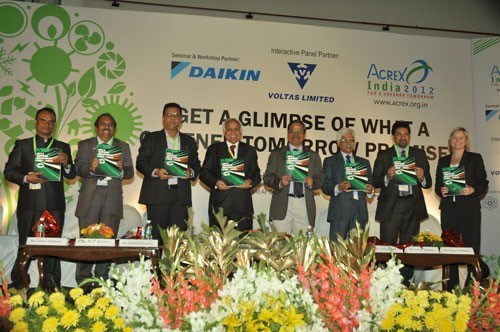 Standing L-R: Abdul Matheen, Director Mechanical IAPMO India; Lt. Gen. S P Sree Kumar, Director General IAPMO India, K P Dominic, National-General Secretary, Fire and security Association of India [FSAI]. Dr. Prem C Jain, Managing Director, Spectral Services and Chairman, Indian Green Building Council [IGBC]; Mr. Sudhakaran Nair, President Indian Plumbing Association [IPA], Deputy Chairman WPC. Mr. Pankaj Shah, Director, SRP Enviro Systems Pvt. Ltd. Bangalore. [National President ISHRAE (2010-11)] [President ASHRAE South India Chapter (2003-04)]; Mr. Ashish Rakheja, Chief Operating Officer, Spectral Services Consultants, an AECOM Company (Past ISHRAE National President, Past ASHRAE India Chapter President, Chairman Technical Committee – IGBC); Ms. Megan Lehtonen, Director of Business development, IAPMO USA.
Standing L-R: Abdul Matheen, Director Mechanical IAPMO India; Lt. Gen. S P Sree Kumar, Director General IAPMO India, K P Dominic, National-General Secretary, Fire and security Association of India [FSAI]. Dr. Prem C Jain, Managing Director, Spectral Services and Chairman, Indian Green Building Council [IGBC]; Mr. Sudhakaran Nair, President Indian Plumbing Association [IPA], Deputy Chairman WPC. Mr. Pankaj Shah, Director, SRP Enviro Systems Pvt. Ltd. Bangalore. [National President ISHRAE (2010-11)] [President ASHRAE South India Chapter (2003-04)]; Mr. Ashish Rakheja, Chief Operating Officer, Spectral Services Consultants, an AECOM Company (Past ISHRAE National President, Past ASHRAE India Chapter President, Chairman Technical Committee – IGBC); Ms. Megan Lehtonen, Director of Business development, IAPMO USA.
The 2012 UMC-I is a revolutionary and powerful tool now at the disposal of those who design, engineer, manufacturer, install, operate and maintain heating ventilation and air conditioning systems, incinerators, and other heat-producing appliances for and within the Indian market.
Jointly developed by IAPMO India and members of the Indian mechanical industry fraternity over a full year, the UMC-I is designed to provide a lucid, comprehensive technical reference on behalf of India’s citizens. The nation’s construction industry has achieved major technological advances in recent years and thus requires its mechanical industry to be able to keep pace with modern mechanical refrigeration, heating, ventilating and air conditioning technology. To that end, the codes, standards and practices employed required improvements if they were to be comparable to international standards. The UMC-I puts the Indian mechanical industry on par with the global community.
Commenting on the significance of UMC-I Dr Prem C Jain Chairman IGBC said: “It is gratifying that IAPMO is continuing to develop for India, Codes and Standards at par with the most recent codes adopted worldwide. We earlier had from IAPMO the Uniform Plumbing Code for India, which has already gone thru the first revision and is extensively used by the Plumbing Fraternity. I am delighted that we now have “Uniform Mechanical Code of India” prepared by IAPMO with the help of Indian Mechanical Industry leaders. I am sure our Mechanical Fraternity in the country will find it an excellent reference for their works.”
Commenting on the significance of Uniform Mechanical Code - India (2012 UMC-I), Pankaj Shah, Chairman of 2012 UMC-I Technical Committee; Director SRP Environ Pvt. Ltd. Bangalore India and immediate past president ISHRAE opined during the launch ceremony.
“The International Association of Plumbing & Mechanical Officials (IAPMO) has taken the lead and come forward with a Uniform Mechanical Code for the entire country which covers many disciplines and processes in mechanical work - air conditioning, refrigeration, heating, ventilation, exhaust systems, boilers, furnaces, solar energy etc. That there should be uniformity amongst professionals in field practices and urge the industrial community to look on the Code as its own and implement it earnestly to achieve ever raising levels of quality of work and also, improve the safety standards in the field. Coming into birth of this Code is indeed a landmark”, I congratulate IAPMO and IAPMO India for this great effort."
Megan Lehtonen, while addressing the gathering during UMC-I release ceremony said: “IAPMO India has enjoyed the great fortune of being associated with many like minded professionals, societies and organizations throughout India toward the development of the Uniform Mechanical Code India, an invaluable combination of our globally gathered expertise and intimate knowledge from India’s best and most seasoned mechanical & HVAC-R professionals,” said Megan Lehtonen, Director of Business Development for IAPMO. “This fruitful relationship has gone a long way in furthering the sharing of knowledge to create better standards and professionals who will ultimately work for the benefit of Indian society.”
Lt. Gen. S P Sree Kumar, Director General IAPMO India said: “Codes and standards forms part of the mandatory requirement in building design to bring back mother earth from the ill effects of Global Warming, Climate Change, Carbon Emission to contribute to conservation of natural resources like water and energy. The International Association of Plumbing & Mechanical Officials (IAPMO) has taken the lead and come forward with a Uniform Mechanical Code for the entire country which covers many disciplines and processes in mechanical work – I am delighted to be part of the Uniform Mechanical Code - India [2012 UMC-I], said Lt. Gen. S P Sree Kumar, Director General IAPMO India and called it “a historical day for India.”
New Delhi, India (Nov. 23, 2011) — An updated version of the Uniform Plumbing Code – India®, developed jointly by the International Association of Plumbing and Mechanical Officials (IAPMO) and the Indian Plumbing Association (IPA), is now available.
IAPMO CEO GP Russ Chaney announced the release of the 2011 Uniform Plumbing Code – India on Nov. 18 during the 15th Indian Plumbing Conference in New Delhi. Originally introduced in February 2008, the UPC‐I serves as the model code of plumbing installation and maintenance for the entire nation of more than 1.1 billion people.
Dan Cole, IAPMO’s Technical Services supervisor, said the majority of changes from the 2008 edition come as a result of aligning the 2011 UPC‐I with the 2009 version of the UPC. English measurements were also removed, he said, and replaced with International System of Units (SI) equivalents. Additionally, the 2011 UPC‐I includes addendums related to copper plumbing products and systems; sewage pump stations and sizing of sump and pumps; and an alternative method of designing a single‐stack vent system.
“The new version of the Uniform Plumbing Code – India is another step toward ensuring the Indian people are served by the most up‐to‐date set of codes governing plumbing practices and the installation and maintenance of plumbing and sanitation systems available,” Chaney said.
IAPMO‐India, the IPA and the Central Public Works Department (CPWD) of the Government of India signed a Memorandum of Understanding in 2009 in which the CPWD voluntarily adopted the UPC‐I and implemented the Plumbing Education to Employment Program (PEEP) curriculum jointly developed by IAPMO‐India and the IPA.
The updated version of the UPC‐I is another example of the ongoing relationship IAPMO has with the IPA and of its strong cooperative presence in the nation.
In March 2011, IAPMO‐India and the IPA announced the release of the Uniform Swimming Pool Code – India (USPC‐I). The code of practice governs the materials, installation and maintenance associated with swimming pool systems for India.
IAPMO-India, in collaboration with the Indian Plumbing Association (IPA), has announced the release of the Uniform Swimming Pool Code - India(USPC-I), a code of practice to govern the materials, installation and maintenance associated with swimming pool plumbing systems for the nation of India. This was announced during the national conference and Plumbex'11 international exhibition at Mumbai, India.
Based on the American National Standard Uniform Swimming Pool, Spa and Hot Tub Code, the USPC-I maintains all of the basic principles of the U.S. code and customizes them to suit Indian laws, conditions and accepted correct engineering practices.
"This code will prove to be an invaluably useful tool for architects, plumbers and other professionals involved in the construction and maintenance of swimming pools, as the country does not presently have comprehensive standards for swimming pool design," said Subhash Deshpande, director, Plumbing, IAPMO-India.
The timing is opportune as public municipal pools and those within gated communities are becoming increasingly more common in India. The code will also serve as a useful reference for the hotel industry.
In addition to providing proper installation instructions ensuring the safe operation of swimming pools, the USPC-I contains information on which materials to use, water heating, vents, chlorinators and all piping standards with which compliance is essential. Common problems addressed by the code include leakage, seeping, flooring damage due to ground water pressure and the health and safety of users.
In 2009, IAPMO-India, the IPA and the Central Public Works Department (CPWD) of the Government of India signed a Memorandum of Understanding in which the CPWD voluntarily adopted the Uniform Plumbing Code - India and implemented a the Plumbing Education to Employment Program (PEEP) curriculum jointly developed by IAPMO-India and the IPA.
For more information, direct your Web browser to http://www.iapmoindia.org.
Pune, India (Sept. 13, 2010) Recognizing the synergies available in the simultaneous promotion of green plumbing practices and energy efficiency and conservation, IAPMO-India and the International Institute for Energy Conservation India (IIEC-India) have signed a Memorandum of Understanding. Together the organizations will promote energy and water efficiency and conservation by improving plumbing and pumping systems through pilot demonstration projects, policy interventions, regulatory mechanisms, financing mechanisms, public awareness and capacity building programs.
"The working relationship between these two forward thinking organizations will now be able to enhance the opportunities for the goals of the Government of India to have Green conservation and sustainable construction to be met and exceeded in the areas of safe, sanitary plumbing and Air Conditioning," said Megan Lehtonen, director of Business Development for IAPMO. "The most exciting aspect is that this is just the beginning."
"When IIEC, IAPMO-India, IPA and ISHRAE meet together to discuss the possibilities, the benefits that can result are almost endless. These activities will serve the people of India well for decades to come."
The MoU was signed in Pune, India, by Lehtonen and Dr. Nitin Pandit, president of IIEC, along with Subhash Deshpande, director of plumbing for IAPMO-India, and Ira Athale Prem, project manager for IIEC-India.
IAPMO-India and IIEC-India will work together to conceptualize the scope and scale of the joint programs at the nexus of energy and water conservation and efficiency, identify funding opportunities and develop a joint strategy for implementation.
"IIEC and IAPMO have considerable international expertise in promoting and implementing energy efficiency and green plumbing," Pandit said. "Our unique collaboration is targeted at addressing India¹s huge untapped potential in energy and water conservation."
IAPMO-India is an Indian Corporation established to develop and promote a uniform plumbing code in India. The organization is dedicated to advancing the most up to date methods of sanitation in India and to provide comprehensive education resources.
IAPMO-India and Indian Plumbing Association (IPA) have jointly published the Uniform Plumbing Code-India (UPC-I) and Green Plumbing Code Supplement-India (GPCS-I).
IAPMO-India and IPA have developed a comprehensive plumbing education curriculum to prepare multiple levels of professionals in India to understand, interpret, engage and apply the provisions of the UPC-I under the Plumbing Education to Employment Program (PEEP). The academic programs, namely the Plumbing Systems Design (PSD), Plumbing Construction Management
(PCM) and Plumbing Technology Program (PTP), developed under PEEP are based on the UPC-I.
GreenPlumbers India (GPI), a collaborative initiative of the IPA and IAPMO-India, is a national training and accreditation program that assists plumbing professionals in understanding their role in the environment and public health. The goal of GreenPlumbers India is to train and deploy a green army of thousands of plumbing professionals to promote the benefits of water conservation and the reduction of green house gas emissions.
IIEC-India is a Section 25 company registered in India and a subsidiary of IIEC, a reputed international non-governmental and not-for-profit organization with a mission to work through its offices in developing countries to accelerate the global adoption of energy efficiency and conservation, climate friendly transport and environmental policies, and modern technologies and practices to enable economic and environmentally sustainable development.
IIEC-India advises central, state and local governments, international donors, energy utilities, private industry, research and academic institutions, non-Governmental organizations and consumer organizations to develop approaches to scale up innovative energy efficiency and conservation programs in multi-disciplined sectors.
IIEC-India leverages international experience in the development of standards and labeling for energy efficient products, such as appliances and equipment, and for the built environment, including public, commercial, industrial and residential buildings. IIEC-India provides advisory services in the design and implementation of financial mechanisms and policies to scale up energy efficiency and conservation measures and programs.
IIEC-India has launched several energy efficiency and conservation programs, which include: inter alia, Mumbai Energy Alliance, Eco-housing India, BESCOM Efficient Lighting Program, Maharashtra Energy Conservation Action Plan and several energy utility demand side management programs.
New Delhi, India (July 3, 2009) – IAPMO-India, the Indian Plumbing Association (IPA) and the Central Public Works Department (CPWD) of the Government of India have signed today a Memorandum of Understanding in which the CPWD shall voluntarily adopt the Uniform Plumbing Code – India and implement the Plumbing Education to Employment Program (PEEP) curriculum jointly developed by IAPMO-India and the IPA.
The CPWD is the principal agency of the Government of India for construction and maintenance of all central government projects, except those of railways, communication, atomic energy, defense, airports (national and international) and radio. It oversees development of projects in the fields of civil, electrical, mechanical and air-conditioning engineering, architecture, horticulture and landscaping.
“The adoption of the Uniform Plumbing Code – India by the CPWD represents a monumental achievement toward the improved health and safety of the Indian people through nationwide standardization of plumbing practices and the installation and maintenance of plumbing/sanitation systems,” said Russ Chaney, executive director of The IAPMO Group, parent organization of IAPMO-India. “Furthermore, the PEEP educational curriculum will make great strides in developing a new highly-skilled and certified plumbing workforce to best implement and regulate the health, safety and sanitary provisions of the UPC-I.
“I wish to thank the CPWD for their faith in our work and commend the tireless efforts of IAPMO-India Director Abdul Matheen, Director of Plumbing Education and Certification Subhash Deshpande and all of the staff, both abroad and in the United States, who helped us complete this landmark achievement.”
In 2007, the IPA and IAPMO formed a partnership aimed at working together to establish a model code of plumbing installation and maintenance for all of India. The IPA’s Code Committee, with support from IAPMO staff, developed the resulting UPC-I, a code of practice that recognizes and utilizes proven international concepts; taking into consideration the established plumbing practices and customs in India.
The IAPMO-IPA partnership, however, did not stop with this colossal achievement. Understanding the need for plumbing education in India, IAPMO, the IPA and the Institute of Plumbing (IIP) formed a partnership agreement to provide plumbing education and training throughout India, leading to the establishment of IAPMO-India Corporation, with offices in Bengaluru and Pune.
A careful needs assessment of the plumbing industry and consultation with eminent members of the plumbing industry led to the development of PEEP, with the goal of preparing multiple levels of professional groups in India to read, understand, interpret, engage and apply the provisions of the UPC-I in order to design and perform initial installation and continued maintenance of plumbing systems. Through the diligent concerted efforts of IAPMO staff in the United States and India, PEEP programs targeting engineers, architects and construction managers have been fully developed and are near implementation, with numerous MoUs having been signed across the entire country of India.
“PEEP has made great strides in recent months,” said Allen Inlow, IAPMO senior director of Business and Product Development. “This MoU signing with CPWD is among the greatest of these strides. The voluntary adoption of the UPC-I and implementation of the PEEP Plumbing Systems Design and Plumbing Construction Management curriculum by CPWD is a true milestone.”
Pune, Maharashtra, India (May 20, 2009) – The College of Engineering Pune (COEP), one of India’s oldest and most reputable institutions of technical higher learning, has signed a Memorandum of Understanding with IAPMO-India, the Indian Plumbing Association (IPA) and the Indian Institute of Plumbing (IIP) to begin offering two courses of study jointly developed by the trio: the Plumbing Systems Design (PSD) and Plumbing Construction Management (PCM) programs.
Established by the British in 1854, COEP is the third oldest engineering college in Asia and in 2004 was granted complete autonomy by the Maharashtra state government. It is affiliated with the University of Pune and is recognized by the All India Council for Technical Education (AICTE). COEP provides educational courses at the Under-Graduate, Post-Graduate and Doctorate levels for numerous branches of engineering.
The Plumbing Systems Design program will be offered at COEP as a two-semester elective course to students in their final year of civil engineering study. This course of study will give students an understanding of the principles and code requirements of plumbing systems and help them develop the ability to design and review these systems. The Plumbing Construction Management program will be offered as a two-semester part-time course to construction managers, contractors, supervisors, architects and interior designers holding a diploma or degree in their respective fields. These individuals will learn the skills necessary to review plumbing systems and supervise their installation in compliance with the principles and code requirements that govern them.
“This historic agreement with an institution as highly regarded as COEP further validates the tireless work of IPA, IIP and IAPMO-India to drastically improve the quality of India’s plumbing workforce, which will in turn significantly improve sanitation and drinking water quality on behalf of the nation’s people,” said GP Russ Chaney, executive director of The IAPMO Group, IAPMO-India’s parent organization.
The PSD and PCM programs are part of the larger Plumbing Education to Employment Program (PEEP) initiative launched by IAPMO-India, IPA and IIP earlier this year following the publication of the Uniform Plumbing Code – India (UPC-I) in 2008. PEEP has been carefully designed to help fill a critical shortage of trained plumbers, plumbing supervisors and plumbing engineers in India. This comprehensive curriculum will prepare multiple levels of professionals to understand, interpret, engage and apply the provisions of the UPC-I on behalf of the 1.1 billion residents of India.
In addition to the PSD and PCM programs to be offered at COEP and other educational institutions, PEEP also includes a Plumbing Technology program designed to provide individuals with the skills to apply a broad range of plumbing principles in real world applications. Through this two-year, part-time course of study, prospective plumbers will learn how to install, repair and maintain a variety of piping systems, plumbing fixtures and other equipment generally associated with water distribution and waste water disposal; and learn the basic principles and code requirements of typical plumbing systems. This program is scheduled to be available in October 2009.
In cooperation with Indian universities, colleges, polytechnics and vocational institutions, the PEEP program will be available all over the country for the 2009-2010 academic year. In addition to these educational institutions, many large contracting and consulting firms, construction related associations and government departments have shown interest in participating in PEEP. A special package known as Plumbing In-House Training (PIT) is now available to those who are interested.
Bengaluru, India (March 2, 2009) — The lack of plumbing infrastructure and a trained, certified workforce has long plagued the citizens of India, for whom 7.5 percent of deaths each year can be directly attributed to water and sanitation issues. In response, IAPMO is working with the Indian Plumbing Association (IPA) and its training arm, the Indian Institute of Plumbing (IIP), to help the nation make big strides forward in both areas of need.
Having already jointly developed the Uniform Plumbing Code-India™ (UPC-I), an extensive code of plumbing practice (published in February 2008) that will serve the people of India for years to come, the organizations subsequently turned their focus to education and training.
The ambitious Plumbing Education to Employment Program (PEEP) will offer structured courses of study to develop plumbing design engineers, plumbing construction managers/supervisors and plumbing installers/repairers.
No architecture or engineering course of study in India currently offers a diploma or degree in plumbing. An overwhelming percentage of the nation’s plumbers are “casual laborers, who have learned the trade through personal experience or working with experienced plumbers,” according to Sudhakaran Nair, IPA president and Executive Board member of the World Plumbing Council.
PEEP will be implemented in partnership with existing colleges, polytechnics and Industrial Training Institutes in India. The program is scheduled to launch in May. In the lead up, expert trainers from IAPMO are conducting “Train the Trainer” programs to educate faculty members at the institutions participating in PEEP.
Graduates of the multi-level education programs created by PEEP will turn out with the following credentials:
• Certified Plumbing Engineer (CPE)
• Certified Plumbing Supervisor (CPS)
• Certified Apprentice Plumber (CAP)
• Certified Master Plumber (CMP)
“The collaboration between IAPMO, the IPA and IIP is an earnest and vitally important attempt to raise plumbing standards on behalf of the people of India,” said GP Russ Chaney, executive director of IAPMO. “We applaud the work of our partners in this effort, as they are on the ground in India making things happen for the good of the entire population.”
A syllabus and training materials for PEEP submitted by IAPMO is ratified by the IPA’s expert committee. Education and training courses will be based on the UPC-I and the IPA, IIP and IAPMO-India will jointly issue all certifications earned through PEEP. IAPMO will support this initiative from its home base in Bengaluru, India.
Bengaluru, India (Oct. 8, 2008) — The International Association of Plumbing and Mechanical Officials (IAPMO) has opened the doors to its IAPMO-India Corporate office in the City of Bengalore, providing a strong platform for the adoption, implementation and education of the Uniform Plumbing Code – India throughout the nation.
Joining The IAPMO Group as Director of IAPMO-India, Abdul Matheen will oversee daily operations of the new office and expand the business unit’s reach and influence in the region. Matheen brings a diverse background with more than 20 years of expertise in thermal engineering, fluid dynamics and project management. Matheen has led M.E.P design teams involved in the building of hospitals, institutions, hotels, IT parks, commercial and residential buildings, high-rise structures and townships, in locations such as Dubai, Bahrain, Qatar and the United Kingdom. As a seasoned professional with global experience, his leadership will be the driving force to the constructive progress of IAPMO-India.
Subhash Deshpande, director of Plumbing Education and Certification for IAPMO-India, will oversee all educational operations of the new corporation. Deshpande is a well-known figure in the plumbing and education fields. With a background that speaks to a passion for education and training, he was the first to conduct, on behalf of the Indian Institute of Plumbing (IIP), the Apprentice Plumbers Training (APT), followed by the Professional Development Course (PDC). His most notable contribution is his conception, design and development of India's first plumbing lab, located at the College of Engineering Pune (COEP).
Gillian D'Crus, office manager administrator, will plan, develop, implement and supervise the general administrative and office services. Her eleven years of experience will be a valuable asset to the organization and promote the smooth operation of IAPMO-India.
These individuals bring a wealth of knowledge and experience that will certainly prove indispensable in achieving a highly regarded and valued program throughout India.
Earlier this year, IAPMO and the Indian Plumbing Association (IPA) introduced the Uniform Plumbing Code – India™ (UPC-I), an extensive code of plumbing practice that will serve the people of India for years to come. Like the UPC, the UPC-India was prepared through a consensus process and will be revised and updated every three years to incorporate the latest advances in technology. Free copies are being distributed to government bodies and educational institutions dealing with the subject.
IAPMO is also working with IPA and its education branch, the IIP, to provide plumbing training and education throughout India. A joint committee of the organizations has already begun working on the curriculum for the Plumbing Education to Employment Program (PEEP), which will offer structured programs for a Plumbing Design Engineer, Plumbing Construction Manager/Supervisor and Plumbing Installer/Repairer. IPA and IAPMO hope to launch PEEP by May 2009.
“With its dedicated staff, IAPMO-India will provide major efficiencies in conducting code work, training and education throughout India,” said Russ Chaney, IAPMO executive director, “and I anticipate in coming years it will grow in focus to manage the increasing opportunities of IAPMO to work with surrounding countries in Asia. This would not have been possible without IAPMO’s partnership with the Indian Plumbing Association. We owe our gratitude to the IPA and look forward to what the future will bring to the citizens of India."
Ontario, Calif. (Dec. 3, 2007) – The International Association of Plumbing and Mechanical Officials (IAPMO) has completed giant strides in cultivating a strong cooperative presence in the nation of India, establishing IAPMO-India and partnering with the Indian Plumbing Association (IPA) to develop a Uniform Plumbing Code for the nation.
The Government of India has approved the establishment of a new Corporation in India: IAPMO Plumbing Codes and Standards India Private Limited, to be known as IAPMO-India. Simultaneously, IAPMO and the IPA, both members of the World Plumbing Council (WPC), agreed upon a comprehensive plan to work together to establish a model code of plumbing installation and maintenance for all of India, the Uniform Plumbing Code – India./P>
IPA President Sudhakaran Nair informed the assembled World Plumbing Council, “The IPA and IAPMO have completed the Uniform Plumbing Code – India, and it will be introduced to all of India at the IPA Annual Meeting, Feb. 11-13, 2008, in the City of Mumbai. It will truly be a world class event, including an ISH Exhibition, and I invite everyone to attend this important event.”
Over a period of little more than a year, an IPA Code Committee worked with IAPMO staff in creating a document that recognized and utilized proven international concepts, always taking into consideration the proven plumbing practices and customs within India. The Uniform Plumbing Code – India™ is the result of that diligent effort.
“I am very proud that IAPMO and I are associated with the IPA and the Uniform Plumbing Code – India,” stated GP Russ Chaney, IAPMO executive director. “It was a massive effort for everyone involved, but the commitment in both time and knowledge by the Code Committee and the leadership of IPA has resulted in an extensive code of plumbing practice that will serve the people of India for years to come.”
In addition to these announcements, IAPMO, the IPA and the Indian Institute of Plumbing (IIP) announced the formation of a partnership agreement to provide plumbing training and education throughout India. The agreement identifies four distinct target markets: Existing and emerging Engineers, Plumbing Project Managers/Supervisors, basic Plumbing Apprenticeship and task training certification of labor skills. A joint Committee of the organizations has been appointed and is already working on the curriculum for each of the four components of the project and development of the training and educational materials.
The three organizations will formally introduce the project at the IPA Annual Meeting in February.
“Given the level of involvement of IAPMO with the Indian Plumbing Association in publishing and promoting the Uniform Plumbing Code – India, and with the Indian Institute of Plumbing and IPA in providing training and education throughout India, the establishment of IAPMO - India is vital,” Chaney said. “It is absolutely the best way to achieve our goals and objectives in working with these two dedicated organizations.”
He went on to announce the opening of a new IAPMO India Corporate office, located in the City of Bengaluru. In making the announcement, Chaney noted, “An architect has already been retained and the design of the IAPMO -India offices has begun.
“This office will provide major efficiencies in conducting the code work and training and education throughout India, and I anticipate it will grow in focus in coming years to manage the increasing opportunities of IAPMO to work with surrounding countries in Asia.”
Sponsor of the Uniform Codes, IAPMO – The International Association of Plumbing and Mechanical Officials – works in concert with government and industry for safe, sanitary plumbing and mechanical systems. Learn more about IAPMO at www.iapmo.org.